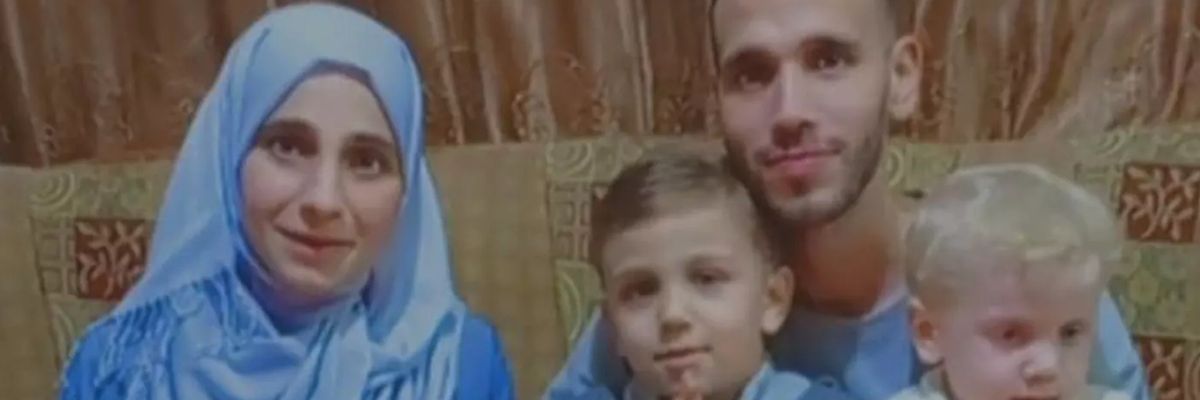December 31, 2023
U.S. lawmakers, in the last quarter of 2023, approved a series of resolutions smearing pro-Palestine activism as anti-Semitic and giving Israel PR cover for its open-ended killing spree, writes Corinna Barnard.
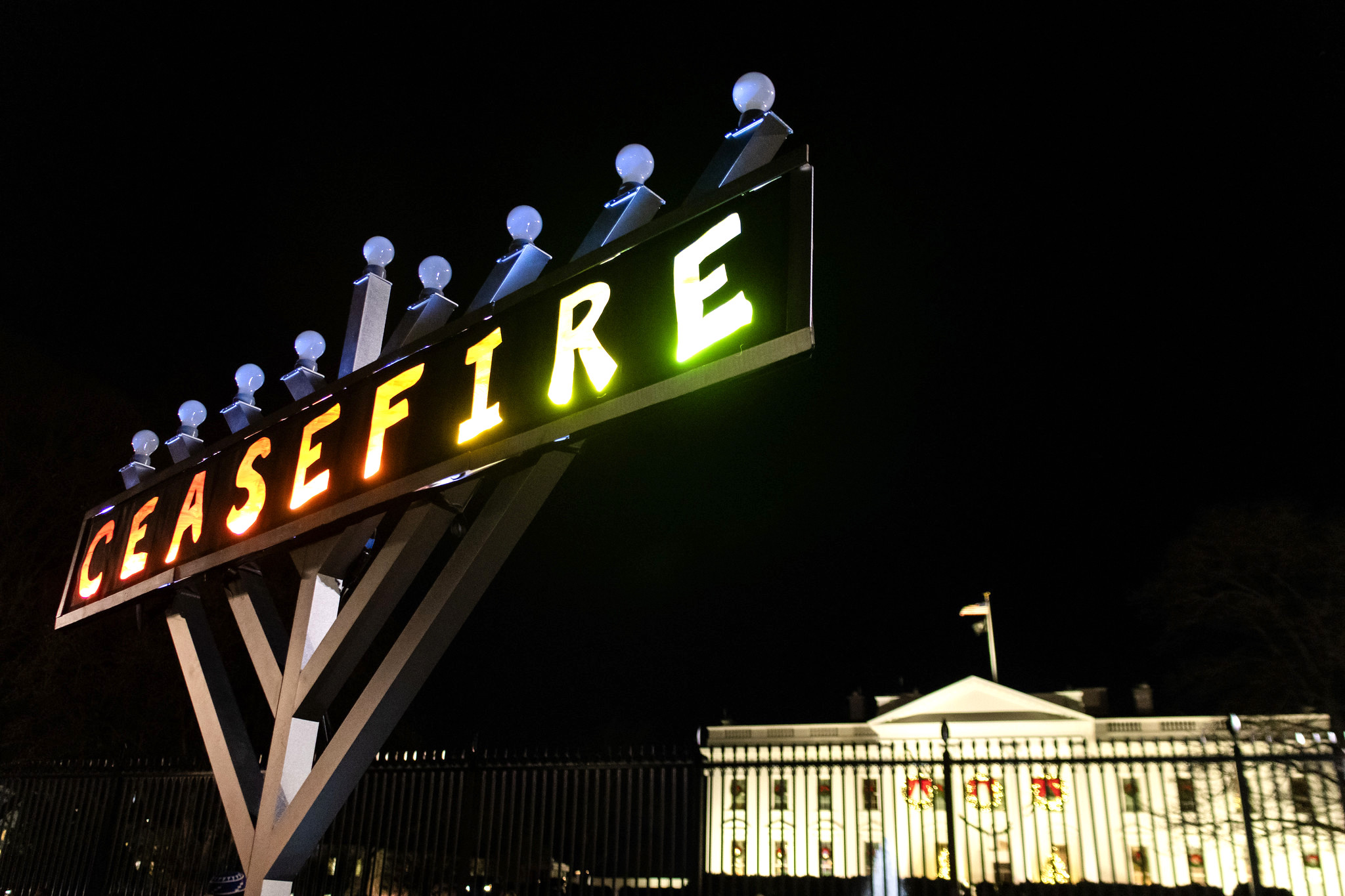
Chanukah for Ceasefire celebration/vigil in front of the White House on Dec. 11. (Diane Krauthamer, Flickr, CC BY-NC-SA 2.0) (Diane Krauthamer, Flickr, CC BY-NC-SA 2.0)
By Corinna Barnard
Special to Consortium News
Congress did not quite match the White House effort to comfort a genocidal Israel. The House approved a $14.3 billion package for the Netanyahu regime, but hinged it on off-setting cuts to the Internal Revenue Service and the bill was blocked in the Senate.
But lawmakers did give Israel heavy-duty backup by stonewalling calls for a ceasefire. Rep. Rashida Tlaib, the sole Palestinian-American in Congress, and a few other lawmakers — all people of color— introduced a “Ceasefire Now” resolution on Oct. 16 that is only slowly gaining co-sponsors. A Data for Progress poll shows that while the majority of Americans support a ceasefire, that position has only marginal support in Congress.
While blotting out any reference to the Palestinian cause, or the immense suffering of the Palestinian people, these resolutions lathered the marauding government with approval. Looking back on them, in the pause before Congress resumes in January, they read like so many decrees of an imperial court intent on generating its own version of events, at complete odds with external reality beyond their chambers.
‘Standing With Israel’
Senate Resolution No. 417, sponsored by Majority Leader Charles Schumer, Democrat of New York, affirmed Israel’s “right to defend itself” and condemned Hamas’ Oct. 7 attacks on civilians.
This was on Oct. 19, 10 days after Israel had imposed a complete siege of the Gaza Strip and made it clear that it was committed to a campaign of slaughter. The Gaza Health Ministry was reporting that at least 3,785 Palestinians had been killed and 12,493 wounded by Israeli strikes on Gaza since Oct. 7.
Massive street demonstrations in cities around the world were raising a hue and cry for a ceasefire and charging the U.S. president with genocide as senators approved the resolution 97-0.
A considerable portion of the opening of the resolution is spent on a reminder of Hamas’ designation as a terrorist organization and harping on the “heinous” crimes the indigenous resistance group committed on Oct. 7.
[Related: Evidence Missing in ‘Mass Rape’ Charge Against Hamas]
This set the keynote for all the resolutions that followed. From No. 417 on, condemnation of Hamas was obligatory, repeated over and over; crowding out any possible criticism of Israeli atrocities before or after Oct. 7.
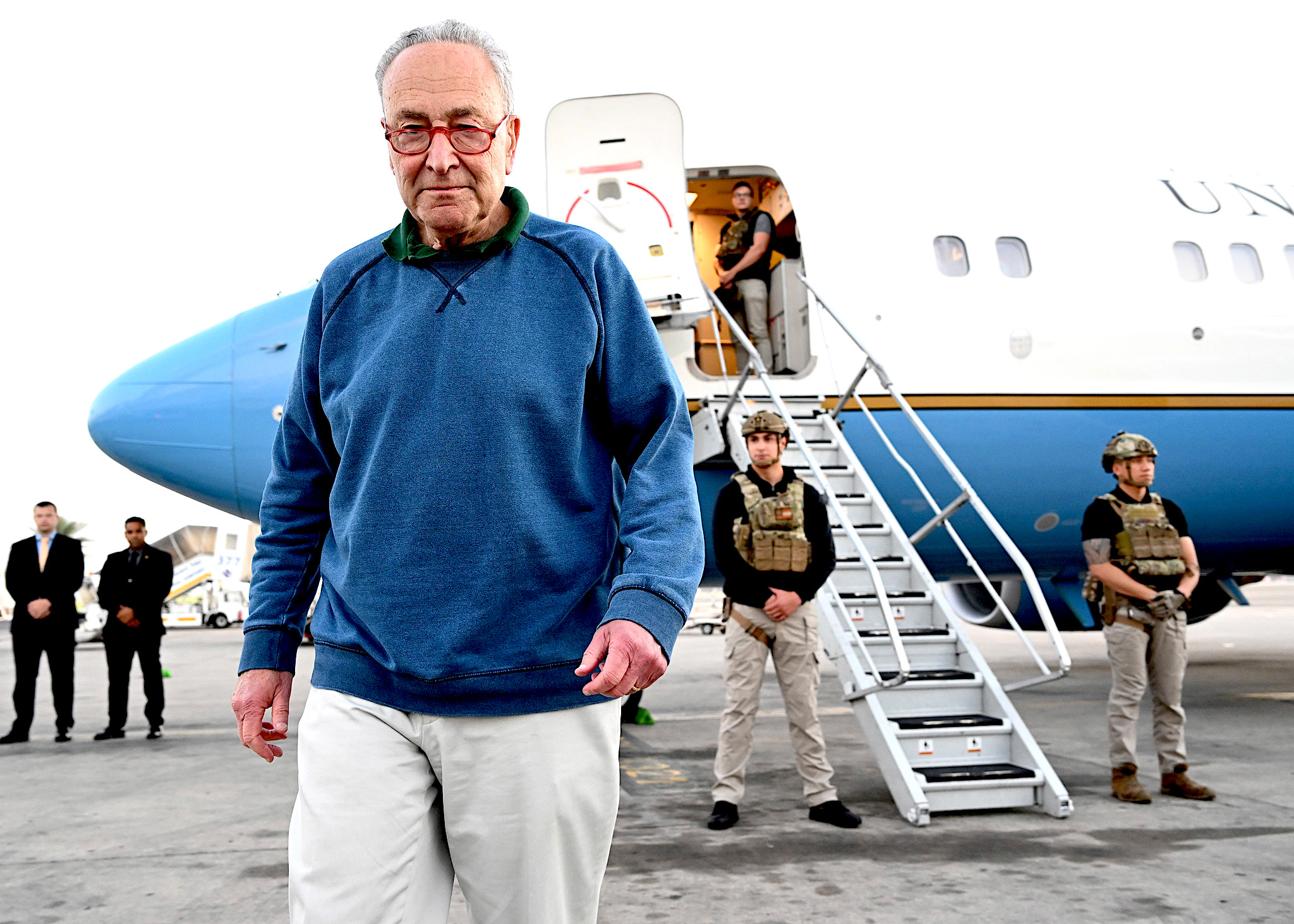
Schumer visiting Israel on Oct. 15. (US Embassy Jerusalem, Flickr, CC BY 2.0)
The House, which had been mired in GOP in-fighting over who would replace their fallen leader, Kevin McCarthy, rushed to issue a matching “standing with Israel as it commits genocide” resolution.
On Oct. 25, the same day Republicans catapulted Mike Johnson — a MAGA legal activist and friend of Christian nationalists — into the speaker post, reps approved, with overwhelming bipartisan support, House Resolution 771, “Standing with Israel as it defends itself against the barbaric war launched by Hamas and other terrorists.”
The lone Republican in the House to vote against No. 771 was Thomas Massie of Kentucky, also the only white person to vote no. All of the nine Democrats in the House who voted “no” were people of color.
[Related: The ‘Genocide Moment’]
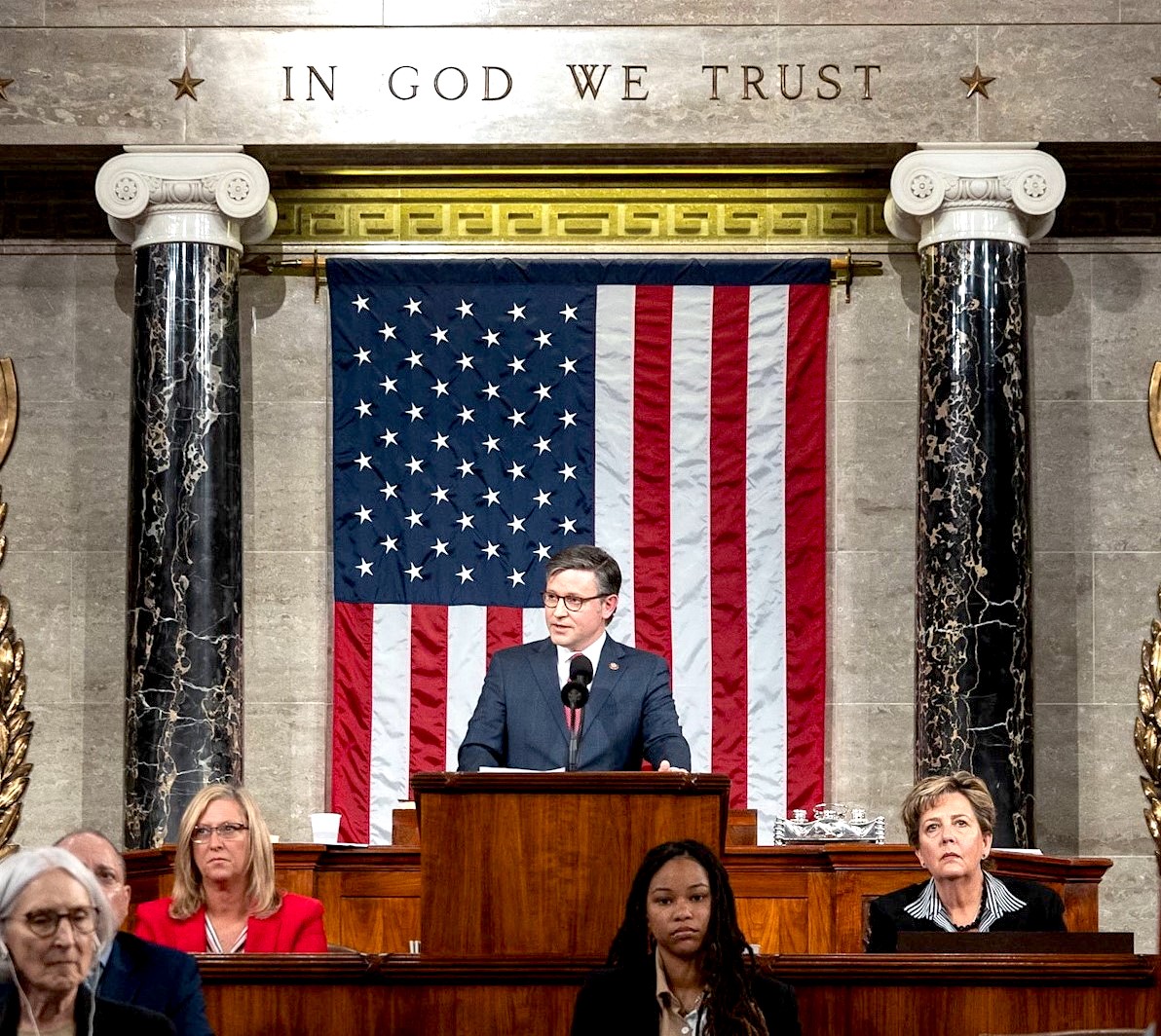
Johnson delivering remarks after his election as speaker of the House on Oct. 25. (Office of Speaker Mike Johnson, Wikimedia Commons, Public domain)
Another resolution followed in the Senate on Oct. 26, when lawmakers issued another obligatory condemnation of Hamas along with “antisemitic student activities on college campuses in the United States.” This resolution, sponsored by Sen. Josh Hawley,
“… denounces the rhetoric of anti-Israel, pro-Hamas student groups as antisemitic, repugnant, and morally contemptible for sympathizing with genocidal violence against the State of Israel and risking the physical safety of Jewish Americans in the United States.”
The House followed suit with a similar resolution on Nov. 2.
With these two strokes, Congress declared open season on student protests against Israel’s campaign of carnage.
Censuring Tlaib
On Nov. 7, congressional representatives moved to censure Rep. Tlaib for “promoting false narratives regarding the October 7, 2023, Hamas attack on Israel and for calling for the destruction of the State of Israel.” (The charges against Tlaib were far from credible as Robin Abcarian lays out in her Los Angeles Times column “Censuring the House’s only Palestinian American is a cynical ploy to silence opposition to Israel.”)
By the time congressional representatives had ganged up on the Michigan Democrat — for what amounted to Tlaib’s refusal to disavow the movement to liberate her ancestral land and people — Israeli forces had killed at least 10,328 Palestinians in Gaza since Oct. 7.
Since resolutions are expressions of sentiment, with no funding attached, they can be used to just vent political hot air. But these resolutions, during rising political opposition to Israel, signaled a congressional counter-attack.
Lawmakers were going after the protest movement that had been energized in opposition to what the Palestinians were going through; a second full-scale Catastrophe, 75 years after the original Nakba.
Condemning Hamas, standing with Israel, censuring Tlaib, completely ignoring the Palestinian viewpoint — by this point, Congress had perfected its three-ingredient recipe for a giant batch of Islamophobia:
1) ignore Israeli culpability 2) scapegoat Palestinians and their allies for Israel’s crimes and 3) give the silent treatment to the pain and agonies of people in Gaza as they are being killed, wounded, driven from their homes and deprived in almost every conceivable way.
Representatives, by the end of November — almost two months into the barbaric slaughter — had gone far beyond treating Palestinians as “lesser victims.” They had suppressed any recognition of Palestinians whatsoever; lowering the blinds, institutionally speaking, on the war criminality of both Israel and the U.S.
The rhetorical, psychic effort to disappear Palestinians in the halls of Congress was sickeningly like what Israel was intent on doing to real people, in real life and death.
Intensifying Attack on Demonstrators
On Dec. 5, the House approved Resolution 894, “strongly condemning and denouncing the drastic rise of antisemitism in the United States and around the world.”
While opening with a broad statement against ethnic bias, the resolution focused exclusively on a grab-bag of incidents of anti-Semitism since Oct. 7. Some look like serious matters, some marginal and some possibly not anti-Semitic incidents at all. It’s hard to say from the way they are written up.
But lawmakers undermined any serious consideration of these incidents by associating them with an ostensible statement about bias-crime that omitted any mention of victimized Palestinian people in the U.S.
In late October the Department of Justice opened a hate-crimes investigation of the murder of Wadea Al Fayoume, a 6-year-old American boy in Illinois whose parents are from a village in the West Bank. The killer stabbed Wadea multiple times. He also stabbed Wadea’s mother, Hanaan Shahin, who was hospitalized with wounds after the attack.
As CNN reported, the family’s landlord was arrested and charged with committing the crimes “allegedly because the tenants are Muslim.”
Joe Biden condemned the murder during a nationwide TV address, but an uncle of Wadea criticized the U.S. president for inciting hatred by repeating false Israeli claims — most notoriously allegations of Hamas beheading babies — and not publicly correcting them.
About a week before the House approved the anti-Semitism resolution, a man in Burlington, Vermont, shot three college students of Palestinian descent. Hisham Awartani of Brown University, the most seriously wounded of the three victims was left paralyzed with a bullet lodged in his spine that surgeons could not remove.
The Real Purpose of No. 894
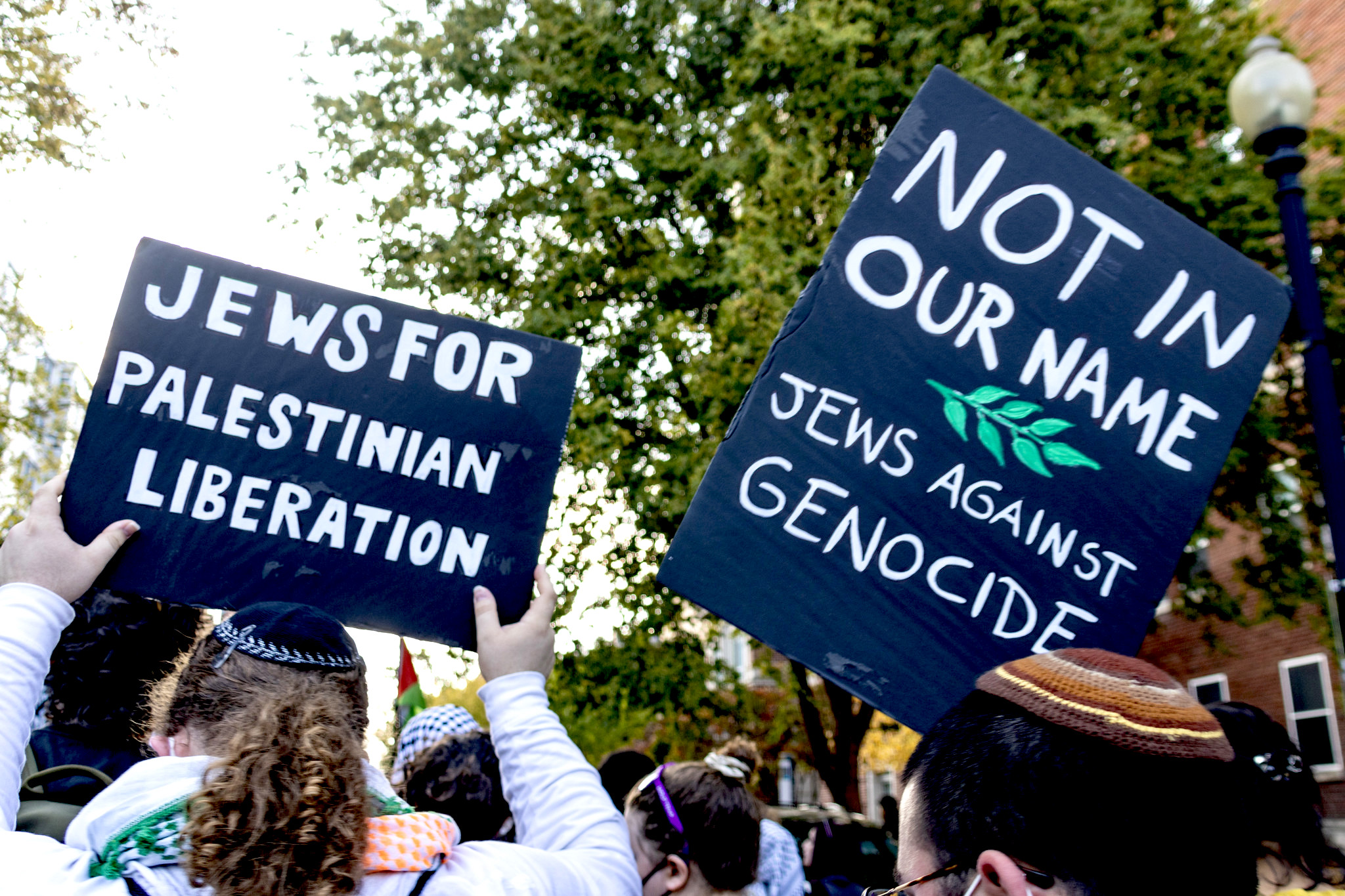
Signs at a Gaza ceasefire rally and march in Washington, D.C., on Oct 28. (Diane Krauthamer, Flickr, CC BY-NC-SA 2.0)
From the get-go, No. 894 was an obvious political decoy. Any sincere effort at reducing ethnic tension would not only take a broad view of bias crimes, it would begin by calling for a ceasefire to end the cause of those tensions: Israel’s violence in Gaza. The tribal approach of this resolution was clearly up to no good. Something else was at work here.
The real intent of Resolution No. 894 becomes clear in its closing declaration that “the House of Representatives clearly and firmly states that anti-Zionism is antisemitism.”
That phrasing caused Rep. Jerry Nadler, a Democrat from New York City, to lead over 100 Democrats to withhold “yeah” votes and vote simply “present.”
Nadler said the resolution “ignores nuanced examples such as the Satmar sect, a Hasidic Jewish movement, which remains staunchly anti-Zionist and quite obviously is not antisemitic.” Nadler represents a New York City district that includes Borough Park, Brooklyn, home to many Hasidic Jews.
The conflation of anti-Semitism with criticism of Israel brings up the International Holocaust Remembrance Alliance, a group of countries led by Sweden that has been working to preserve and bolster public awareness of the atrocities Jews suffered under in Nazi Germany.
The IHRA set itself the task of defining anti-Semitism and as part of that produced a list of illustrative examples. Among them: “Denying the Jewish people their right to self-determination, e.g., by claiming that the existence of a State of Israel is a racist endeavor.”
“The rhetorical, psychic effort to disappear Palestinians in the halls of Congress was sickeningly like what Israel was intent on doing to real people, in real life and death.”
The IHRA’s decision to make criticism of Israel an example of anti-Semitism has drawn valid controversy for inoculating Israel from legitimate criticism. This objection is extremely consequential now.
At any time in the past several years, Israel’s apologists reflexively denounced criticism of the country as anti-Semitic, giving the Netanyahu regime space, in that time, to become increasingly hateful and extreme.
Had criticism of Israel been more permissible, it might have helped steer the nation off its current, genocidal course.
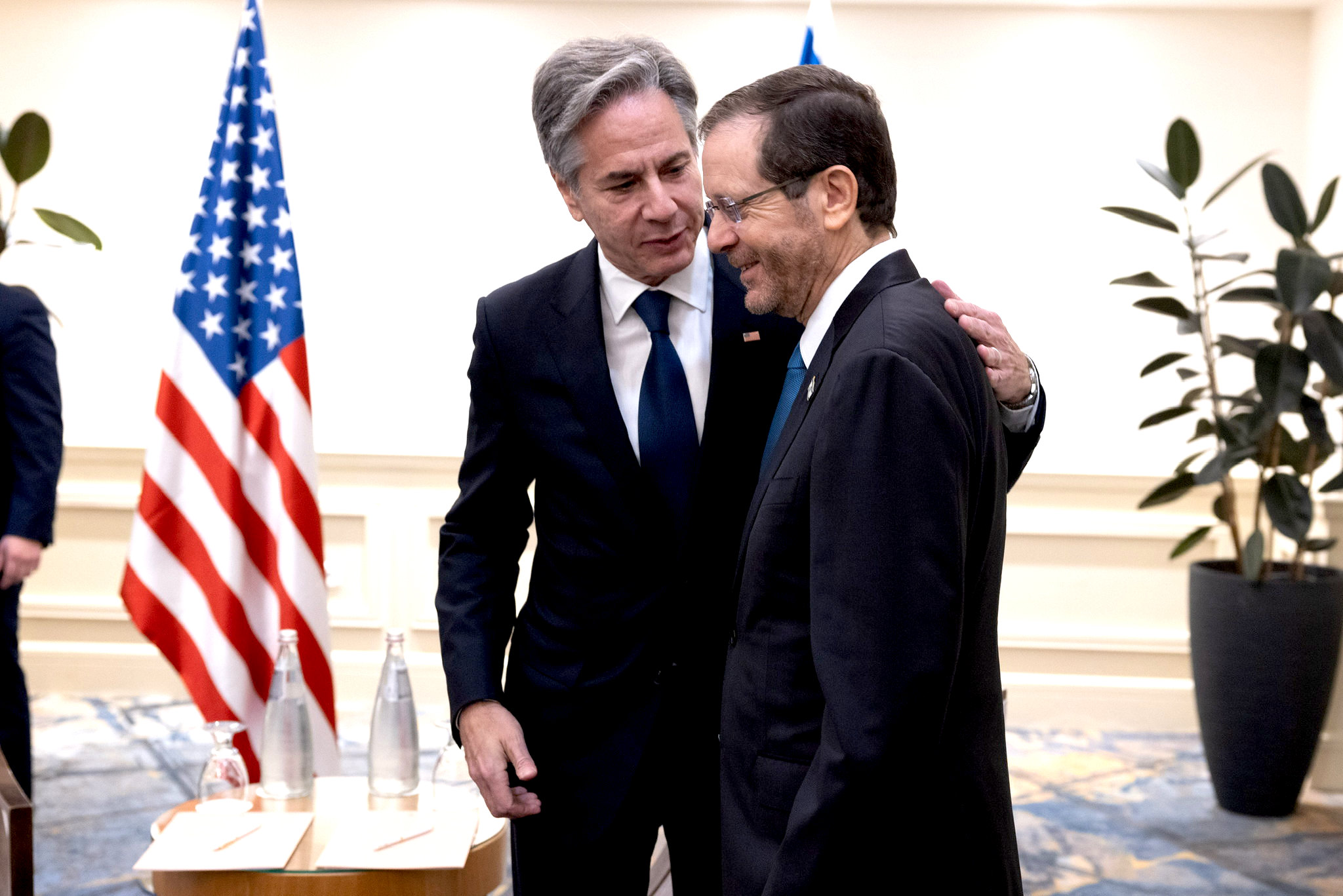
U.S. Secretary of State Antony Blinken with Israeli President Isaac Herzog in Tel Aviv on Nov. 30. (State Department, Chuck Kennedy)
Last May, the State Department put the IHRA’s controversial definition at the center of its hefty plan for combating anti-Semitism; a decision that historian Lawrence Davidson criticized in his article “Misdirecting the Fight Against Anti-Semitism.”
By embracing the IHRA’s definition, Davidson wrote, the Biden State Department had complicated “the fight against anti-Semitism by publicly announcing that the administration was willing to ignore the prima facie fact that Israel has been documented to in fact be ‘a racist endeavor.’ ”
U.S. lawmakers turned Congress into their own “racist endeavor” by issuing an outcry against ethnic-bias crimes that overlooked the murder in Illinois of Wadea Al-Fayoume; the serious injuring of Hanaan Shahin, Wadea’s mother; and the shooting of Hisham Awartani and his two friends in Vermont.
In late December a few legislators introduced a resolution to “memorialize” 6-year-old Wadea. The wording includes opposition to anti-Semitism and Islamophobia — both, together.
The bill is co-sponsored by Democrats Delia Ramirez of Illinois, Lauren Underwood of Illinois Sara Jacobs of California and Bonnie Watson Coleman of New Jersey, all of whom joined Nadler in voting against No. 894. We will see how it fares in the new year.
Virginia Foxx’s Hearing

Rep. Virginia Foxx opening a hearing on anti-Semitism on college campuses on Dec. 5. (C-Span still)
On Dec. 5, as lawmakers were condemning the rise of anti-Semitism, the congressional attack on student demonstrations in solidarity with Palestine was heating up. That same day, Rep. Virginia Foxx, Republican from North Carolina, opened a congressional hearing on “anti-Semitism on college campuses.”
Three university presidents had been called for questioning about pro-Palestinian demonstrations on their campuses that members of Congress had decided to construe as involving anti-Semitic speech.
The three witnesses were Harvard’s Claudine Gay, M.I.T.’s Sally Kornbluth and the University of Pennsylvania’s Elizabeth Magill. They gave a lukewarm defense of students’ constitutional right to protest which, despite its timidity, outraged one of their inquisitors, in particular.
As widely reported, Rep. Elise Stefanik made headlines when a clip from the hearing of her aggressive attack on Penn President Magill went viral.
“They failed on a global stage,” Stefanik gloated afterwards, in reference to the trio of presidents. “What will go down in congressional history as the most-viewed congressional testimony in the history of the United States Congress.”
A couple of days after her infamous run-in with Stefanik, Magill resigned. That left blood in the water for the sharks to circle, as they are doing now at Harvard. It will be a purge if the Republican representative from New York has her way.
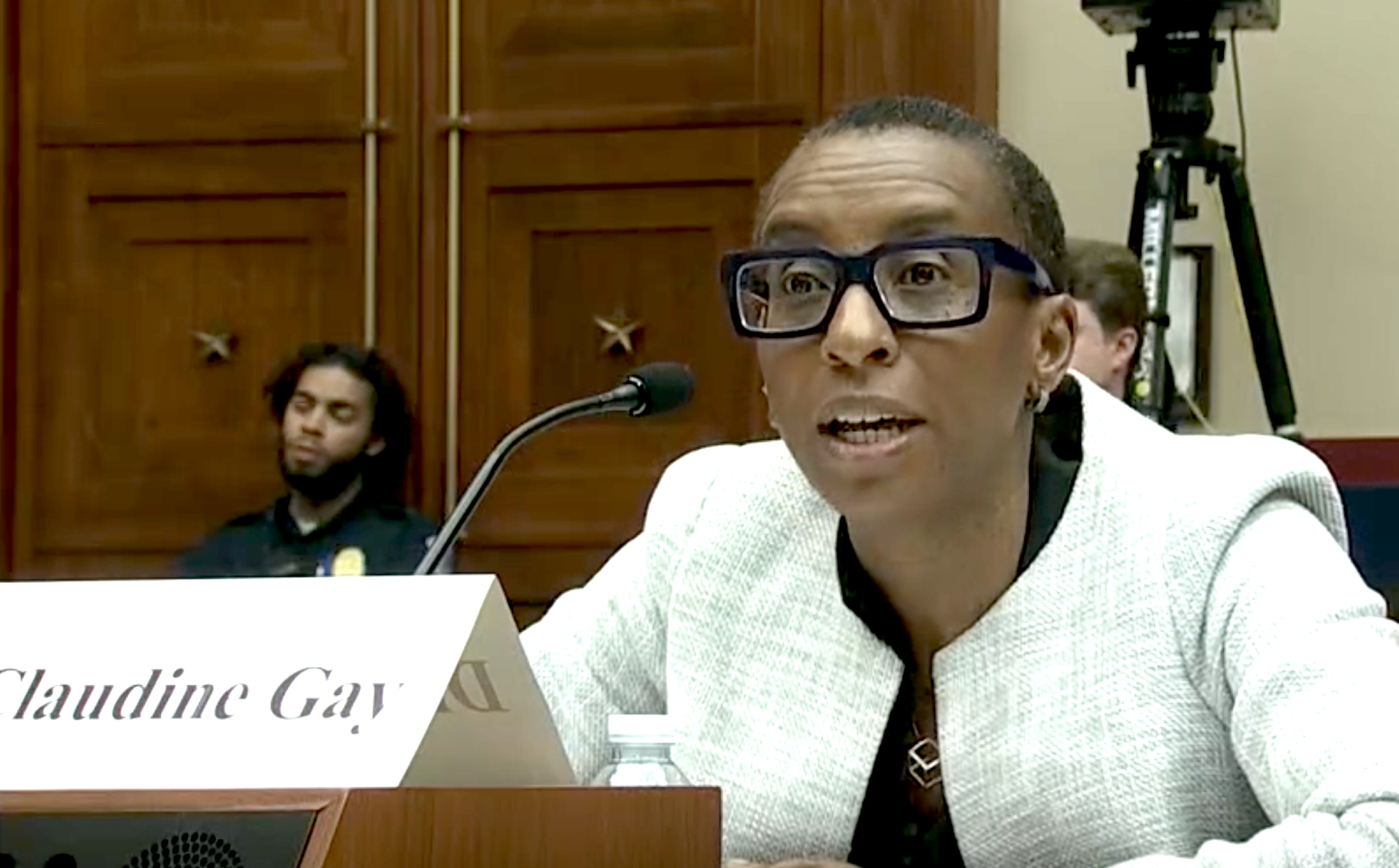
Harvard’s Claudine Gay during the Dec. 5 congressional hearing. (C-Span)
[Related: US Students for Palestine Under Attack]
On Dec. 13, a triumphant Stefanik sponsored House resolution No. 927. This one condemned “anti-Semitism on university campuses and the previous week’s testimony by university presidents to the House Committee on Education and the Workforce.” It passed a roll call vote with 303 “yeas.”
Stefanik may have stolen the show in the committee hearing, but Foxx also deserves a star turn for the way she opened her political-persecution hearing on Dec. 5.
“Today,” Fox told Gay, Kornbluth and Magill, “each of you will have a chance to answer to and atone for the many specific instances of vitriolic, hate filled, anti-Semitism on your respective campuses.”
That was how she greeted three university presidents — by giving them a chance to atone.
[See: Zionist Suppression in Congress]
After laying out the atonement welcome mat, Foxx went on to quote some pearl-clutching comments by Sen. Schumer concerning demonstrators who chant slogans such as “intifada,” an Arabic word for uprising.
“Many of the people who express these sentiments in America aren’t neo-Nazis or card carrying Klan members or Islamist extremists,” Schumer said, according to Foxx’s quoting. “They are in many cases, people that most liberal Jewish Americans felt previously were their ideological fellow travelers. Not long ago, many of us marched together for Black and Brown lives.”
By the time Schumer was trying to make a Fifth Column out of people saying words and slogans in protests, the U.S.-backed Israeli military had since Oct. 7 killed more than 15,900 Palestinians in Gaza.
After instructing the three university presidents to prepare for atonement, after amplifying Schumer’s alarmist rhetoric, Foxx introduced video clips of student demonstrations at the three campuses of the three presidents. It was clear from her manner that the room was about to witness something of grave concern.
All the videos revealed were students engaging in peaceful protest; calling for the liberation of Palestine, the survival of Gaza. “Intifada Revolution; Intifada Revolution,” they chanted. That was it.
The video clips were shown in a surreal, sanitized void; with no reference to the massive crime wave Israel was committing against humanity in Gaza. There were no dead bodies to see; no bombed hospitals; no streams of refugees, no lists of dead journalists; no piles of white shrouds, no names of dead poets.
There was nothing to explain why students might be calling for an uprising.
The production crew for Foxx’s videos had arranged ominous closing music. As that soundtrack faded, the chair of the Committee on Education and the Workforce looked meaningfully around the room, as though some point had been made about the scenes shown in those videos.
It was a Rorschach test, in which, for some apparently, the very sight of students demonstrating on behalf of Palestinians had become evidence of heresy.
Trail of Tears

Map of the expulsion process of Indigenous people, 1830–1838. Oklahoma is depicted in light yellow-green. (Nikater, Wikimedia Commons, Public domain)
Members of the U.S. Congress have been supporting Israel unconditionally for so long that it is almost automatic, no matter what Israel does. The core of this support is the demonstrated power of the Israel Lobby to fund a politician’s opponents, jeopardizing their careers.
On a more philosophical level, the kinship between the stories of two settler colonial nations may make it too difficult for members of Congress to face this history.
Think of the way the U.S. government encouraged white colonialist settlers in the 19th century to dehumanize the way they thought of the Indigenous people in order to force them off their homelands. Virulent racism is required to commit an ethnic cleansing.
“What good man would prefer a country covered with forests and ranged by a few thousand savages to our extensive Republic, studded with cities, towns, and prosperous farms … “ President Andrew Jackson said in an 1830 address on behalf of his Indian Removal Act.
In that address, Jackson rested his argument for occupying and annexing land in part on the great sacrifices of the white settlers’ forebears; an argument that resonates today in Israeli justifications for its takeover of Palestine.
“Doubtless it will be painful to leave the graves of their fathers,” Jackson said, “but what do they [sic] more than our ancestors did or than our children are now doing? To better their condition in an unknown land our forefathers left all that was dear in earthly objects.”
Catharine Beecher, an early American women’s rights activist and sister of Harriet Beecher Stowe, the author of Uncle Tom’s Cabin, was an ardent opponent of Jackson’s plan to force indigenous people off their land. In 1829 and 1830, the women’s movement Beecher sparked to protest Jackson’s Indian Removal Bill is known as the first national campaign on the part of women in the United States.
In a petition, Beecher wrote:
“it has become almost a certainty, that these people are to have their lands torn from them, and to be driven into western wilds and to final annihilation, unless the feelings of a humane and Christian nation shall be aroused to prevent the unhallowed sacrifice….”
The feelings of a humane and Christian nation were not sufficiently aroused. The U.S. Army force-marched members of the Choctaw, Chickasaw, Seminole, Muscogee/Creek and Cherokee nations off rich, arable land east of the Mississippi River over a vast distance to the dry soil of Oklahoma in what the Cherokee called their Trail of Tears.
For the kinds of agony they suffered, the world has only to look at Gaza now.

Corinna Barnard, deputy editor of Consortium News, formerly worked in editing capacities for Women’s eNews, The Wall Street Journal and Dow Jones Newswires. At the start of her career she was managing editor for the magazine Nuclear Times, which covered the antinuclear war movement.
The views expressed are solely those of the author and may or may not reflect those of Consortium News.


/cdn.vox-cdn.com/uploads/chorus_image/image/73012524/1861251469.0.jpg)
